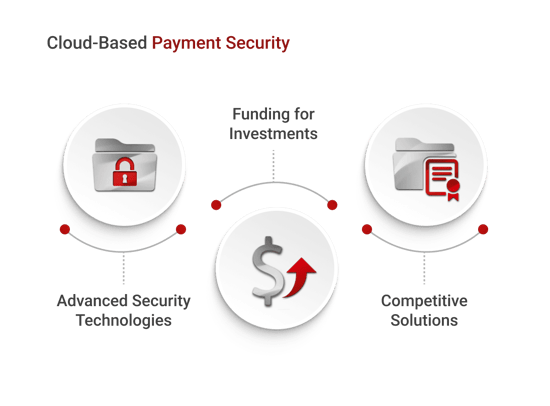In This Article:
- Top Trends Shaping Cloud Security Priorities
- Critical Areas for Cloud Payment Security Investments
- The Case for Incremental Cloud Budgets
- Growth with Cloud Security Investments
- Future-Proofing Payments
As payments move to the cloud...
For many organizations, cloud security is seen as a costly checkbox - necessary to mitigate risk but rarely viewed as a strategic advantage.
But what if it could be?
Cloud security is no longer just a defensive strategy; it drives business growth and resilience.
- When approached strategically, it becomes a tool for unlocking measurable ROI.
- Beyond safeguarding against breaches, investing in robust cloud payment security solutions helps businesses easily adapt to changing regulatory landscapes, build customer trust, and avoid the devastating financial consequences of data loss.
The rise of post-quantum computing (PQC) threats adds more urgency to adopting future-ready solutions.
Security leaders need to move the conversation away from “How much will this cost?” to “How much can we gain?”
In this article, we’ll explore actionable strategies for securing incremental budgets for cloud payment security. From aligning initiatives with business goals to emphasizing ROI, discover how to frame cloud payment security as an essential investment for competitive advantage.
It’s time to redefine the narrative to make the case for cloud payment security as an essential, strategic investment.
Top Trends Shaping Cloud Security Priorities
As organizations accelerate their shift to the cloud, new trends are reshaping security priorities and migration strategies.
From the rise of zero-trust architectures and post-quantum encryption to the growing focus on compliance in multi-cloud environments, businesses are navigating a rapidly evolving landscape.
Security leaders need to deliver cutting-edge protection on a tight budget, so understanding these trends is essential for crafting a robust cloud security strategy that addresses emerging threats and enables innovation and scalability.
Let’s explore the top forces driving change in cloud security and what they mean for your organization's future.
- Growing Cloud Adoption: By 2027, Gartner predicts that over 70% of enterprises will leverage cloud technologies to accelerate business transformation initiatives.
- Rising Online Payment Fraud: Juniper Research projects global online payment fraud to exceed $343 billion by 2027, underscoring the urgency and impact of robust cloud security.
- Generative AI Expansion: Advancements in AI are widening the cloud threat landscape, necessitating more significant investments in protective measures.

Critical Areas for Cloud Payment Security Investments
Cloud-Specific PCI Requirements
The Payment Card Industry Data Security Standard (PCI DSS) 4.0 guidelines now address challenges unique to cloud environments.
Aligning with these standards secures payment card data and reinforces compliance with the PCI Security Standards Council's guidelines, supporting the case for increased budgets.

Multi-Tenant HSMs
Modern cloud hardware security modules (HSMs) support multitenancy, allowing multiple users to share the same HSM securely.
This innovation reduces hardware costs while maintaining strict cryptographic isolation, making it an efficient and cost-effective solution for safeguarding sensitive payment data.

Virtualized HSMs
Virtualized HSMs enhance multitenancy by using a single host to create multiple virtual instances. These instances deliver dedicated cryptographic services to users while maximizing resource efficiency.
Virtualized HSMs provide scalability and flexibility, enabling organizations to customize their encryption infrastructure to meet specific needs without investing in additional hardware.
Beyond Multi-Tenancy: Introducing CryptoHub
Although multi-tenant HSMs efficiently deliver shared functionality, they are limited to performing the same tasks across users. CryptoHub transcends these limitations by offering a unified platform capable of supporting every HSM use case within a single system.
CryptoHub provides unmatched flexibility through its modular, on-demand design.
Organizations can easily scale up or down, deploying only the features they require with just a few clicks.
Whether it’s encryption, key management, or tokenization, CryptoHub’s platform adapts to evolving needs and deploys solutions in minutes.
With this advanced capability, businesses can streamline cryptographic operations, ensuring a robust, future-ready infrastructure.
Modernizing PQC Infrastructure
Quantum computing threats render outdated cryptographic mechanisms inadequate. Unified cryptographic solutions reduce latency, streamline key management, and ensure compliance with evolving regulations – future-proofing payment systems against emerging vulnerabilities.

The Case for Incremental Cloud Budgets
Securing funding for advanced cloud security technologies protects payment data, defends against cyber threats, and ensures secure transactions.
The proper budgets transform cloud strategies from concept to reality, enabling organizations to stay competitive and resilient.

Growth with Cloud Security Investments
- Enhanced Resource Allocation: Larger budgets enable IT teams to delegate operational tasks, such as routine maintenance or basic troubleshooting, to outsourced providers or automated systems. This shift allows internal staff to focus on strategic projects like improving infrastructure resiliency or developing innovative solutions that align with business goals.
- Flexibility for Emerging Trends: With additional funding, businesses can allocate resources to monitor and respond to market changes. For example, adopting new cloud-based technologies or scaling services in response to customer demands becomes feasible and timely, giving businesses a competitive edge.
- Faster Market Expansion: Investing in scalable cloud infrastructure provides the capacity to expand operations into new markets without significant delays. This means faster go-to-market strategies and the ability to seize opportunities in strategic regions, fostering growth.
- Regulatory Compliance: Increased budgets allow organizations to invest in specialized tools and services that address specific compliance requirements, such as automated audit tools for PCI DSS or localized solutions for regional payment regulations. These investments not only mitigate risks but also protect against potential legal and financial penalties.
Future-Proofing Payments
Securing IT budgets for cloud migration and payment security is critical to driving growth, meeting regulatory mandates, and mitigating risks.

These investments enhance operations, minimize vulnerabilities, and position organizations to seize new opportunities in the evolving cloud landscape.
IT teams must champion the resources needed to innovate in the payments ecosystem and address the challenges of post-quantum cryptography (PQC).
With 40% of IT security budgets spent managing complexity, siloed cryptographic systems increase breach risks and strain resources. Simplify your encryption management today. Download "Safeguard Your Security: Transforming Encryption with CryptoHub."

